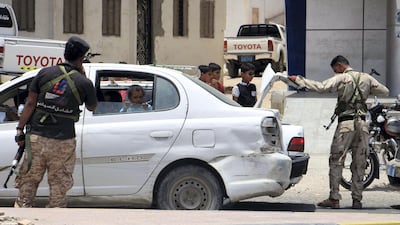Elite Yemeni forces backed by the UAE army and US military drove Al Qaeda militants from a stronghold in southern Yemen on Thursday.
The morning raid in Shabwa province dealt a huge blow to the extremists in the region, a UAE military official told the state news agency Wam.
The Yemeni forces were comprised of fighters from tribal families in Shabwa, who were trained by Emirati forces. They were joined by Yemeni fighters from Hadramawt province.
The Al Qaeda militants, who had managed to establish a presence in the area, suffered heavy casualties, Wam said. The report added the Yemeni forces were received jubilantly by the villagers, who had been forced to live under Al Qaeda’s oppressive rule.
While no death toll was available, Wam said those militants who were not killed in the operation, fled the area.
Extremist groups like Al Qaeda in the Arabian Peninsula and ISIL have attempted to take advantage of Yemen’s civil war by attacking Yemeni security forces and civilians and building strongholds in the south.
But the Arab coalition supporting the Yemeni government against Houthi rebels, has increasingly turned its attention to eliminating the extremist groups. Donald Trump has also increased US involvement in the battle against Al Qaeda’s Yemen branch. US special forces carried out a raid in Al Bayda province in January.
Yemeni forces supported by the UAE drove Al Qaeda from the city of Mukalla in April 2016 after the extremists had captured the city a year earlier.
The victory in Shabwa took place two weeks after Yemeni counter-terrorism troops arrested three Al Qaeda militants during an operation in Hadramawt.
Since a spate of attacks in 2015, the Yemeni forces have been able to secure cities and towns in the south and made progress in providing security in surrounding regions.
Thursday’s raid came as the UN’s special envoy to Yemen held meetings in Muscat in an attempt to resume peace talks between the Yemeni government and Houthi rebels, who have been at war for more than two years.
Fighting has recently intensified with clashes near Mokha on Yemen’s Red Sea coast killing more than 40 troops and rebels at the beginning of this week
The UN has described Yemen as the “largest humanitarian crisis in the world”, warning that 80 per cent of country’s children need aid. Some 400,000 Yemenis have contracted cholera in an outbreak that has killed 2,000 people.

